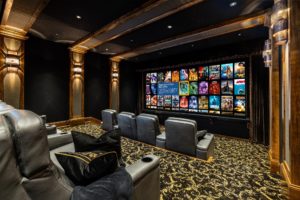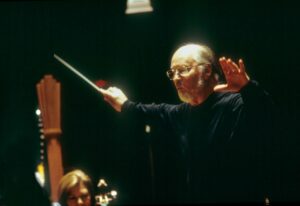Why Private Cinema Is Good for Your Health
At home and in life, there are items that we can say are either “essential to have” (such as air, food or water) or “nice to have” (such as cars, boats or airplanes). Most people would put a private cinema squarely in the column of things that are “nice to have.” But what if we consider a private cinema from the perspective of providing health benefits?
At first glance, such a notion might sound strange or outlandish, but the fact of the matter is that it’s a very valid concept that’s backed up by science.
Healthy Stimulation
First of all, movies stimulate both the body and the mind. A study by researchers at Britain’s University College London found that the heartbeat rates of movie audience members were elevated during screenings, reaching between 40 and 80 percent of their maximums in many cases. Cognitive Sciences Professor Joseph Devlin, who ran the study, said this illustrates the power of physiological responses to cinema.
“What we see is that the heart rate and electrodermal activity — an indirect measure of emotional arousal — go up and down with the narrative arc of the movie — meaning their heart rates elevate and drop depending on their engagement with the story,” notes Devlin. “Big emotional moments in a film, like Aladdin and Jasmine’s first kiss [in the Disney movie Aladdin], for example, produced peaks of physiological activity, indicating a strong emotional response from the audience.”
A Distraction-Free Environment
Additional research Devlin oversaw looked at two basic elements of cinema experiences: the fact that watching a movie is a focused activity and that there are shared social engagement. Both of these elements possess proven long-term benefits for focus, memory, productivity and overall brain functioning.
Indeed, a movie screening is a distraction-free environment. “Our modern lives are characterized by multitasking, social media distractions, and many items competing for our attention,” observes Devlin. “Cinema and other cultural events provide space to concentrate and practice focusing. At the cinema specifically, there is nothing to do except immerse yourself.”
Increased Social Bonds
“Despite the fact that these people [in the audience] are all strangers to one another, their hearts begin to beat in synchrony while watching a film together,” Devlin explains. “What we know from previous work is that when people demonstrate synchronized physiological responses like this, they also show stronger social and emotional bonds.”
Participants in Devlin’s study were questioned about their feelings toward their fellow audience members both before and after seeing a movie. A majority reported feeling closer and more connected to their peers simply via the act of watching a film.
COVID Boosted Private Cinemas
During the COVID-19 pandemic, when opportunities to go to a real movie theater or see live entertainment were eliminated due to lockdowns, private cinemas got a boost as people became aware that public theaters were not the only option for watching movies or listening to music in a larger setting.
Private cinemas helped people relieve feelings of isolation, loneliness, despair and limitation. These spaces became ways people could communicate with one another and vicariously share their entertainment. They were places where people could socialize in the absence of other safe spaces to do so; private cinemas were places where people could forget about the pandemic for a few hours and enjoy the magical experience of moviegoing and music listening. Private cinema owners could retain the right and the ability to gather at least a small number of people together and brighten days that were at times very dark.
Elevating Moods
For the above reasons and others, the act of watching a movie has been shown to elevate people’s moods and reduce stress.
A recent study at Brandeis University looked at the mood of those people who had more leisure activities in their lives versus those who had less and found that those who engaged in more leisure pursuits had better mental states as a result of feeling that their time was well-spent.
Meanwhile, researchers at Seoul, South Korea’s Sahmyook University discovered that increased levels of dopamine and serotonin produced by laughter and other responses to entertainment mitigated biological indicators of stress, including increased cortisol, epinephrine, growth hormone and 3,4-Dihydroxyphenylacetic acid (DOPAC).
Relaxation and Motivation
Extrapolating from these ideas, it’s natural to see that cinema can both relax and motivate people. An article in the scientific journal Media Psychology by Michigan State University Professor Allison Eden and University of Amsterdam Professor Tilo Hartmann described how, when given a choice, participants in a study who were depleted from other activities would choose media to watch that specifically was non-challenging, indicating that their choice of subject matter was associated with feelings of comfort.
In terms of motivation, researcher Ryan Niemic at Cincinnati’s VIA Institute on Character reported in a 2020 clinical case study that movies can be enjoyable, empowering and engaging, inspiring viewers to reach new insights into themselves, the human condition and others around them.
Cinema as Therapy
In fact, College of Southern Nevada Professor Gary Solomon coined the term “cinematherapy” and even wrote a book about it, entitled The Motion Picture Prescription: Watch This Movie, and Call Me in the Morning. According to Solomon, movie watching has therapeutic benefits by allowing people to see characters that have problems similar to their own and observing how they respond to and resolve them. Movie viewers are free to watch and re-watch movies or parts of movies that have an emotional impact or produce an emotional response — such as sadness or anger — without fear of being shamed or judged.
Solomon believes that movie watching can benefit people going through overwhelming experiences like physical abuse, substance abuse, divorce or the death of a loved one, and it can also be combined with traditional psychiatric therapy.
Taking this concept further, Andrew Scahill, an assistant professor of English at the University of Colorado in Denver, says that horror movies offer a way to relieve stress and anxiety by allowing viewers to build an inner resiliency to threats — both real and imagined. “Today, we have what we would call ‘surrogacy theory,’ which essentially says horror films allow us, in a way, to control our fear of death by giving us a surrogate experience,” says Scahill. “Our body is telling us we’re in danger, but we know that we’re safe in these cushy theater seats. Allowing yourself to be triggered in a safe environment can actually be a process of therapy.”
According to Kurt Oaklee, the founder of Oaklee Psychotherapy in San Francisco, “[Horror] can teach us how to handle real-world stress better. During a stressful film, we’re intentionally exposing ourselves to anxiety-producing stimuli. We usually don’t engage in the same unhealthy coping mechanisms that we utilize in real life. We learn how to manage stress in the moment. This practice can translate to helping us manage everyday stressors and fears.”
How Sound Helps
As with any discussion about private cinema, a certain portion is often devoted to sound, and when speaking about health benefits, this topic is a natural sidebar.
At University College London, Acoustics Professor Jian Kang and researchers Francesco Aletta, Andrew Mitchell and Mercede Erfanian have studied the psychophysiological implications of soundscapes — which are defined by the International Standards Organization (ISO) as “the human’s perception of the acoustic environment, in context, accompanying physiological and psychological responses.”
These researchers have found that people tend to categorize sounds into those that are wanted (desirable) and those that are unwanted (annoying). Reducing unwanted sounds (which many people term “noise”) helps support stress recovery, and better health and wellbeing.
Separating Sound from Noise
By contrast, studies by the World Health Organization have shown that excessive exposure to noise can contribute to negative health conditions, such as cognitive impairment, obesity, ischemic heart disease and adverse metabolic effects.
In the scientific journal Frontiers in Psychology, Tianjin University lecturer Hui Ma and researcher Jing Chen claim that noise “has been proven to be a risk factor of physiological and psychological health. Therefore, creating a high-quality acoustic environment for people is particularly important.” In a study of 75 participants, Ma and Chen found that a healthy acoustic environment is one “that matches people’s physiological, psychological, and behavioral demands in context, and that also fits [their] criteria and standards.”
The Power of Music
Certainly, a proper private cinema helps to reduce unwanted sounds by filtering out external and/or outside noise. University College London Professor Kang and researcher Aletta argue that music, in particular, is an integral component of a modern urban soundscape and that “[music] has the potential to enhance the social experience of a place.”
A 2018 article in Time magazine cited studies showing that music can buoy mood and fend off depression. It’s also been shown to ease pain, improve blood flow similar to the way that statin medications do and lower levels of stress-related hormones like cortisol. People who have listened to music prior to undergoing a medical operation have been shown to have better post-surgery outcomes.
Kim Innes, a professor of epidemiology at West Virginia University’s School of Public Health, says that music selectively activates neurochemical systems and brain structures associated with memory, attention, emotion regulation and positive moods. Innes was a co-author of a 2016 study that found that music could reduce stress and improve the well-being of older adults suffering cognitive decline; the study compared the benefits of music to those exhibited by meditation. Both practices were linked to meaningful improvements in sleep quality and mood.
Daniel Levitin, a psychology professor who researches the cognitive neuroscience of music at Canada’s McGill University, explains that rhythm and other characteristics of the music we play can modulate heart rate and the activity of brain neural networks. Levitin says that the effect certain music has on people is subjective and varies by the person; for some listeners, tracks with drawn-out notes, slow tempos and gradual chord progressions can be calming. But for other people, heavy metal music is soothing. “There’s no one piece of music that will do the same thing for everyone,” he suggests.
Levitin adds that there’s not a specific “music center” in the brain. “One thing people find surprising is that music activates nearly every region of the brain we’ve mapped so far,” he contends. This proves that music has a universal power to affect us. As confirmation of this, many people have their own go-to list of songs that they use to de-stress, pump themselves up and/or otherwise shift their mental or emotional state.
Still, says Levitin, “We [often] fool ourselves into thinking we can do two things at once.” While some inspirational music might help a person to exercise longer or harder, listening to calming music likely won’t help them unwind if they’re listening to it while also engaging in a stimulating activity, such as scrolling through their news or social media feeds.
Music Therapy
Just as there’s such a thing as “cinema therapy” (see above), there’s also a well-established practice of music therapy. “Music therapy starts with the idea that, as therapists, we’re collaborating with a person who’s looking to help themselves to feel more complete or optimistic — or to discover parts of themselves they aren’t aware of — using music,” states Alan Turry, the managing director of New York University’s Nordoff-Robbins Center for Music Therapy. “Music is a way to bypass our rational side and get in touch with the emotional life we often keep hidden. If people are having trouble, there’s usually a way that music can help.”
Pop singer Adele discovered this recently when she spent time exploring sound baths, which are typically created by crystal or metallic “singing bowls,” gongs and tiny cymbals, all of which produce powerful vibrations used to induce relaxation and other pleasurable feelings. According to Tamara Goldsby, a research psychologist at the University of California at San Diego, sound baths “elicit the relaxation response, and in the relaxation response, the body relaxes, the blood pressure lowers, the heart rate lowers, and the body basically goes into healing mode.”
“Whether you’re listening to music or playing a musical instrument, your brain and your body typically experience changes that are beneficial,” asserts Helen Lavretsky, the director of the Late-Life Mood, Stress and Wellness Program at the University of California at Los Angeles (UCLA). At the Ronald Reagan UCLA Medical Center, hospital physicians can order music therapy for their patients just as they might order occupational or physical therapy for them. “Sound is the easiest and most ancient way to evoke positive emotions, even for people who are very ill,” Lavretsky posits. “It connects us to life.”
Reinvigorating the Body, the Mind and the Spirit
On reflection, both movies and music are ways we can reinvigorate our bodies, our minds and even our spirits as we amplify cultural works that remind us of our humanity and who we are as people.
There can be no denying that private cinemas are potent spaces we can use to achieve this — spaces that, on balance, move them from a category of “nice to have” to something more essential.








